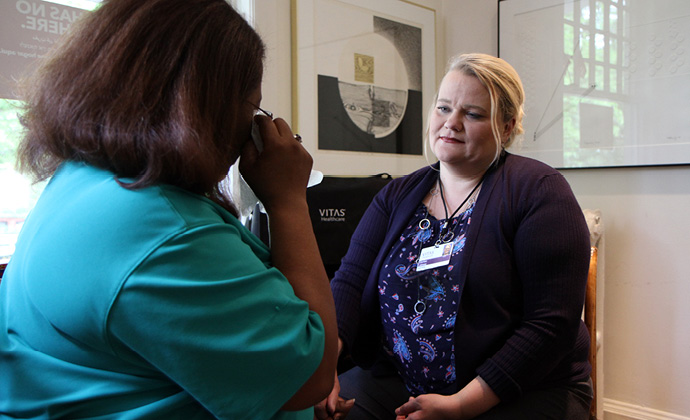Pastoral Care
A hospice chaplain is a critical member of each hospice team, focused on a patient’s and family’s spiritual and emotional needs so that other team members can attend to physical and psychological needs that arise near the end of life.
Receiving a terminal diagnosis is far more than a medical issue. Facing the prospect of one’s mortality is fraught with issues of spirituality, the meaning of life and questions about the afterlife, whether patients are deeply religious or unaligned with any established religion.

Each hospice team includes a chaplain who provides pastoral care to both the patient and family, able to offer or arrange whatever support is needed to help them through the non-medical issues and challenges that arise near the end of life.
One VITAS hospice chaplain describes his role as that of a coach: “I help the family find their own answers and their own release from fears and worries.”
Another, when asked by a young child to explain what he does at work every day, put it this way: “Every day, I ask the Lord to fill me up with love, and then I go out and give it all away to our hospice patients and their families.”
Pastoral Hospice Care: For Believers and Non-Believers
Hospice chaplains provide a variety of interventions, including pastoral counseling, spiritual assessments and overall guidance as patients and families deal with the spiritual dynamics of illness, loss and death.
Even if a patient or family has no religious affiliation at all, hospice chaplains are trained to work with people of all cultures, belief systems, traditions and religious orientations. If a family requests spiritual help from a pastoral representative of a different faith than his/her own, for example, the hospice chaplain will make available the services of a priest, rabbi, minister or other faith leader.
Primarily, hospice chaplains simply make themselves available to patients and families. They listen. They talk. They hold hands. They share stories. They ask questions. They reassure and comfort. They pray or read inspirational materials to patients and families. They provide guidance when needed or requested. They serve as a sounding board for the questions, concerns and fears that might arise at the end of life.
Supporting Patients and Families
Hospice chaplains also become involved in some of the decisions that arise throughout the dying process. They might provide input on decisions about Do Not Resuscitate orders or funeral arrangements. They might help patients and families choose the readings or songs for memorial services. They serve as a sounding board for spouses, partners and family members who struggle with “anticipatory grief,” the impending sense of loss that can arise even before a loved one dies.
Sometimes, an on-call hospice physician might be the only hospice team member who is present at a patient’s death, responsible for recording the time of death, notifying a funeral home and supporting the family.
The chaplain works closely with other members of the hospice team: physician, nurse, aide, social workers, bereavement specialist and volunteer. Their role is to address the psychosocial and spiritual issues that are intimately linked to a life-limiting diagnosis.
Read more about a day in the life of a hospice chaplain.
Are you looking for a career as a Hospice Chaplain? View our open positions today.